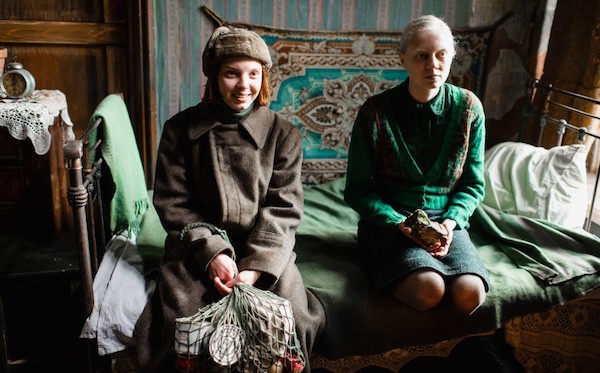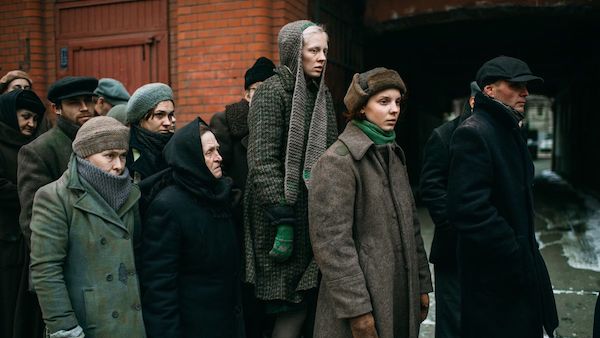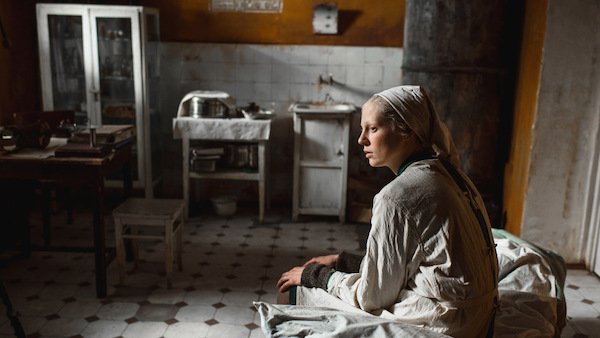Beanpole: Post & Present Trauma

Beanpole, the second feature from acclaimed, young Russian director Kantemir Balagov, is incredibly intense and bleak, almost unbearably so at times. Though its painfully drawn out scenes are sometimes hard to watch, Beanpole is nevertheless a compelling and emotionally crushing film for most of its 130-minute runtime.
The film revisits a particularly rough time in Russian history—the immediate aftermath of World War II, when soldiers have returned from the front missing body parts and worse. Though this period has certainly been covered before, Balagov’s approach is novel, focusing on two young female machine gunners who became close during the war and reunite in Leningrad. Their fraught, almost animalistic relationship embodies the suffering each has been through; their peculiar bond is demonstrated in several scenes by long stretches in which they seem to communicate by staring wordlessly into each other’s eyes.
Iya (Viktoria Miroshnichenko), the tall, pale “beanpole” of the film’s title, is first shown having a kind of seizure, during which she emits short gasps and seems paralyzed. This state is almost casually referred to as “frozen” by the people who work with her in a hospital tending to war injuries. She lives with her young son, Pashka, in a communal living space that is rundown and faded, but (thanks to cinematographer Ksenia Sereda) full of eye-catching bright greens and scarlets, colors that show up in worn but colorful clothes, in addition to curtains, wallpaper and painted surfaces. Sereda’s dark, rich palette is a suitably dramatic backdrop for the movie. The hospital’s male patients–including the young paralyzed Stepan—clearly appreciate Iya’s care, as well as Pashka’s visits; they seem almost desperate to amuse the boy with animal sounds in one scene.

A horrible accident occurs right before Iya is reunited with her former war comrade, Masha (Vasilisa Perelygina), and we learn that Pashka is actually Masha’s son, left with Iya when the latter was “invalided out” of the war due to shell-shock (a perfect description for her catatonic spells). Watching a clearly distraught Iya try to answer Masha’s repeated questions about Pashka’s whereabouts is the first of many prolonged, uncomfortable scenes between the two women.
Masha, with her strange, intermittent smiles and mysterious nosebleeds, is clearly as war-damaged as her friend. Her new grief manifests itself in a cheerful, almost deranged desire to bear another child, though her body has been completely ravaged. She soon joins Iya as an aide in the hospital under the supervision of decent-seeming doctor Nikolai (Andrey Bykov), as the film’s brutal, unpredictable plot continues to unfold.
Aside from the lives of the two women, there is the plight of the paralyzed Stepan, who—along with his traumatized wife—decides he (literally) cannot go on living this way. (He will soon be discharged from the hospital and cannot afford the care he needs.) Though Iya is horrified and resistant, she assists him in a scene that is both excruciating and poignant. Masha uses this act of mercy to further her own desires, forcing the reluctant Iya to go long with her plan. Throughout the film, each woman grapples with power over the other, resulting in a volatile, sometimes affectionate, dynamic.

As the emotional atrocities pile up, we become almost, but not quite, inured to the devastation. By the time Beanpole arrives at a scene in which Masha and her boyfriend’s mother have a verbal duel and we learn the details of Masha’s past, it’s hardly surprising.
Beanpole seems classically Russian in its hopeless melancholy. Though there is a lot of talk by various characters about life getting better now that the war is over, we see mostly pain and trauma. Scenes that are set outside the hospital or the women’s living quarters show that the entire city seems to be under a pall of sad numbness.
Though almost unremitting in its bleakness, Beanpole is a film that is that is as powerful and haunting as it is somber, thanks to the bone-deep performances of its two leads and its creator’s singular vision.
Beanpole opens on Wednesday, January 29, at Film Forum in NYC.
—Marina Zogbi

